
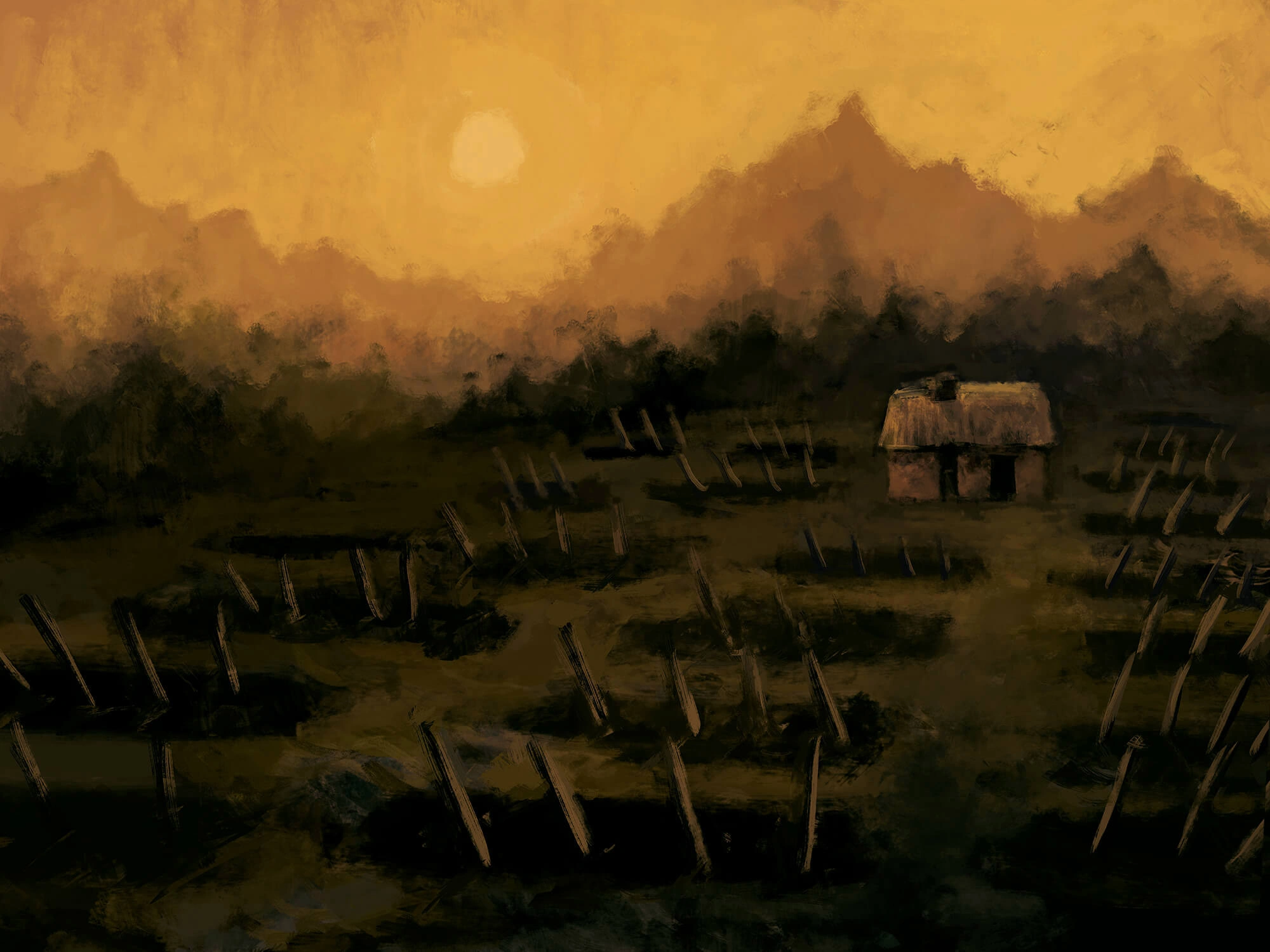
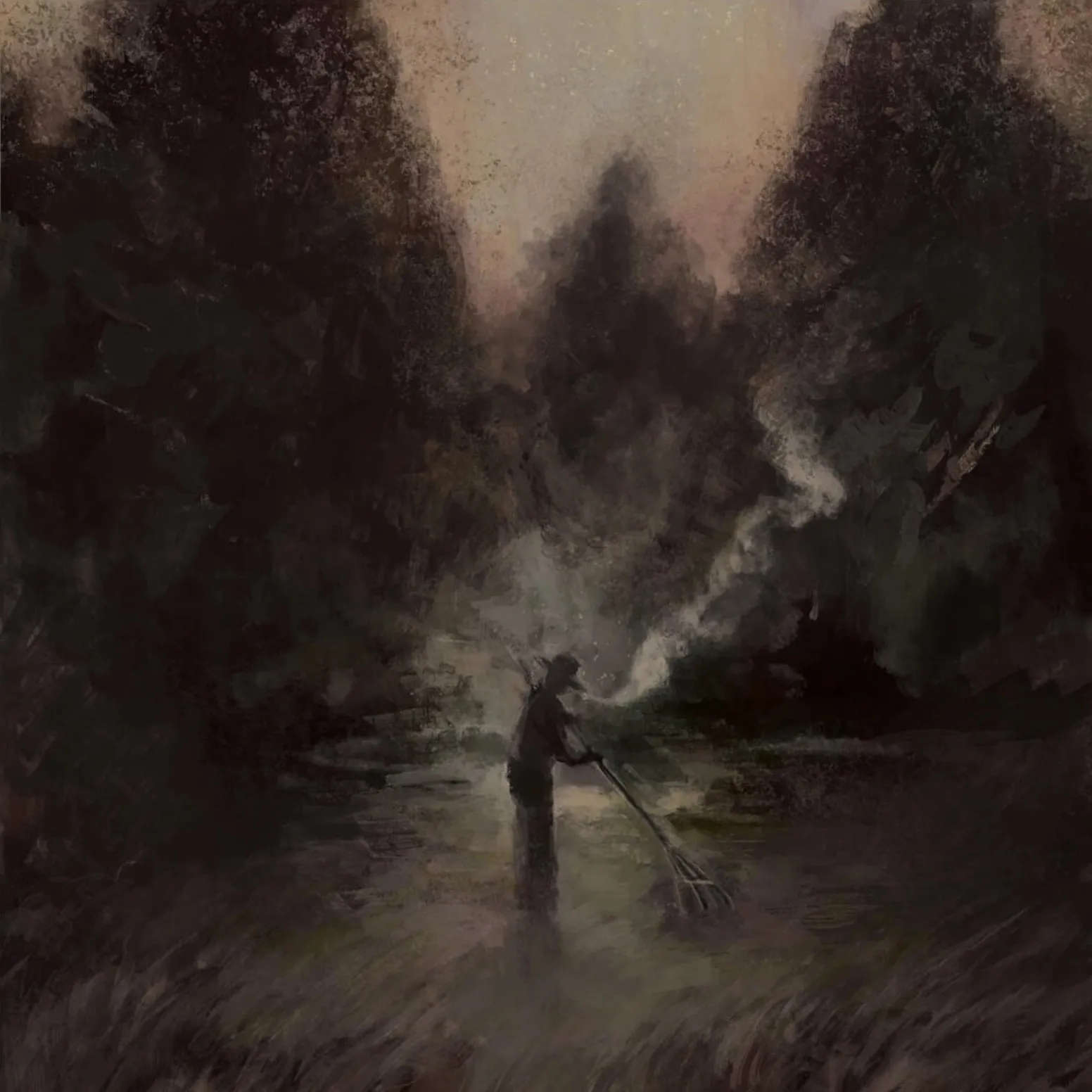
SPRING
He grabbed his trousers, shirt, and boots and wrapped a heavy wool blanket around his shoulders to keep warm. The scent of tobacco and wet earth lingered on the blanket from the previous day and from the day before that — and from the day before that one too. Even if he had little hope for his crops, he felt his best when he kept busy, working in the fields in the early morning with a lit pipe in his mouth. The tough weeds that had made it through the winter were steadily stripping the soil of what little essence remained, and he went to work pulling them up one by one until the dew burnt off the grass and the sun rose higher in the sky, casting the fields silvery-white. He figured that even if he wasn’t around to see the fruits of his labor he could at least provide a service for whoever might chance upon this land after him.
As he worked he felt like he was being watched, and in the shadows of the pines around the field he noticed a red fox hiding and tracking his every move. The creature seemed oddly intelligent and its gaze was personal, not like an animal but like a wise being observing without fear. It behaved strangely too, walking when he walked and stopping when he stopped. In the half-light filtering through the trees it looked mythical, like a creature flickering in and out of reality. A mirage of the woods. For a while the man tracked the creature tracking him, but seeing that they meant each other no harm, he finally broke his gaze. When he looked up again at the woods, the fox was nowhere to be found and the pines looked black and voracious against the haze of the morning. He felt haunted.
Tired, he took his blanket from his shoulders and threw it on the ground, crushing dried weeds and grass beneath its weight and he slowly brought himself down upon it to rest. With each passing year he found himself having to rest after less and less work. Soon the weeds would outpace him. He faced the old apple tree, the only one of its kind on his land. He couldn’t remember the last time it had given fruit.
Next to him was an old scarecrow he’d erected many years ago, its clothes ragged and tattered by pesky birds too smart or too dumb to consider it a threat. He lit his pipe and looked up through the smoke and considered the outline of the effigy against the sky. Its silhouette looked hunched and menacing from below, but at eye-level it seemed silly with its wilting hat and boneless body stuffed with hay and garbed in his old clothes. Its head was made from an old hemp sack cinched at the neck and its face was affixed with two button eyes and a scribbled mouth, though much of its smile had worn away after suffering the elements for so long.
There was something oddly human about the crudely-drawn face that compelled the man to talk. “Might be the end,” he said. His voice sounded strange in his ears as he spoke and it scratched his throat as the words came out.
“Hope yet,” it said.
At first the man assumed he was imagining it or that he’d kept speaking without meaning to, unable to stop his tongue after letting it lay dormant for so long. The voice sounded like his own but harsher, raspier, as though instead of traveling through muscle and flesh it was rustling in something hard and dry.
He turned toward the scarecrow. The scarecrow had turned toward him.
“Hope yet,” it said again.
He thought that he should feel afraid — that he should run away, but he didn’t. He studied the scarecrow. Its shirt was nothing more than scraps and rags connected by the most tenuous threads with straw sticking out everywhere between. The fabric looked like it might disintegrate with a light touch. Its face was motionless but its eyes were unmistakably fixed on his own.
There was no one around to hear and no one but himself to be embarrassed by, so he chanced it.
“That right?” he said, casting a doubtful look out onto the acres of dried, gnarled weeds.
“With the right care,” the scarecrow said. Its mouth didn’t move when it spoke but its straw rustled a bit, its ragged clothes quivering slightly. “Plenty of life left in this earth.”
Speaking felt so alien to the man that it hardly mattered that it was with a scarecrow. After so long on his own now, it would have been no less strange to talk to another person.
“Thought I tried everything,” the man said, hoisting himself up from the ground. The scarecrow’s head didn’t move, but he felt like its eyes were following him. “Fertilizers, rotations. Prayers, even.” He shook his head. “Won’t need it much longer, regardless.”
The man jumped as the scarecrow animated and swung its limp tree-branch arms in emphasis. “Just listen to me,” it said. “Take my advice. Much as you know this land, you’re not rooted in it.”
The man waited for his heart to stop racing and nodded. “Can’t do any worse than last year,” he said.
“You’ve done about all you can for the day,” the scarecrow said. There was something pleasing about the dry quality of its voice; there was no room in it for guile or deception. Nothing but the honest truth. “You go home. Rest up. Tomorrow morning come with tools and seeds. Nothing else.”
The man nodded again, turned and walked away shaking his head.
“Make sure to feed the cat,” the scarecrow called after him.
The man did as the scarecrow said. The cat rubbed up against his leg appreciatively and he scratched it on the top of its head. It was batting something around, a ball of twine the man had made from old flax some years ago. He glanced warily toward the woods but the fox was nowhere to be seen.
Inside, he dug through his closet for another shirt. He wasn’t sure if the scarecrow could feel the elements but he thought it deserved more dignity either way. He found one that looked much like the one it was already wearing before it had gone to rags.
He laid the shirt across his bedside table so he wouldn’t forget it the next morning. “Bring the tools, the seeds” he said, out loud, to no one in particular.
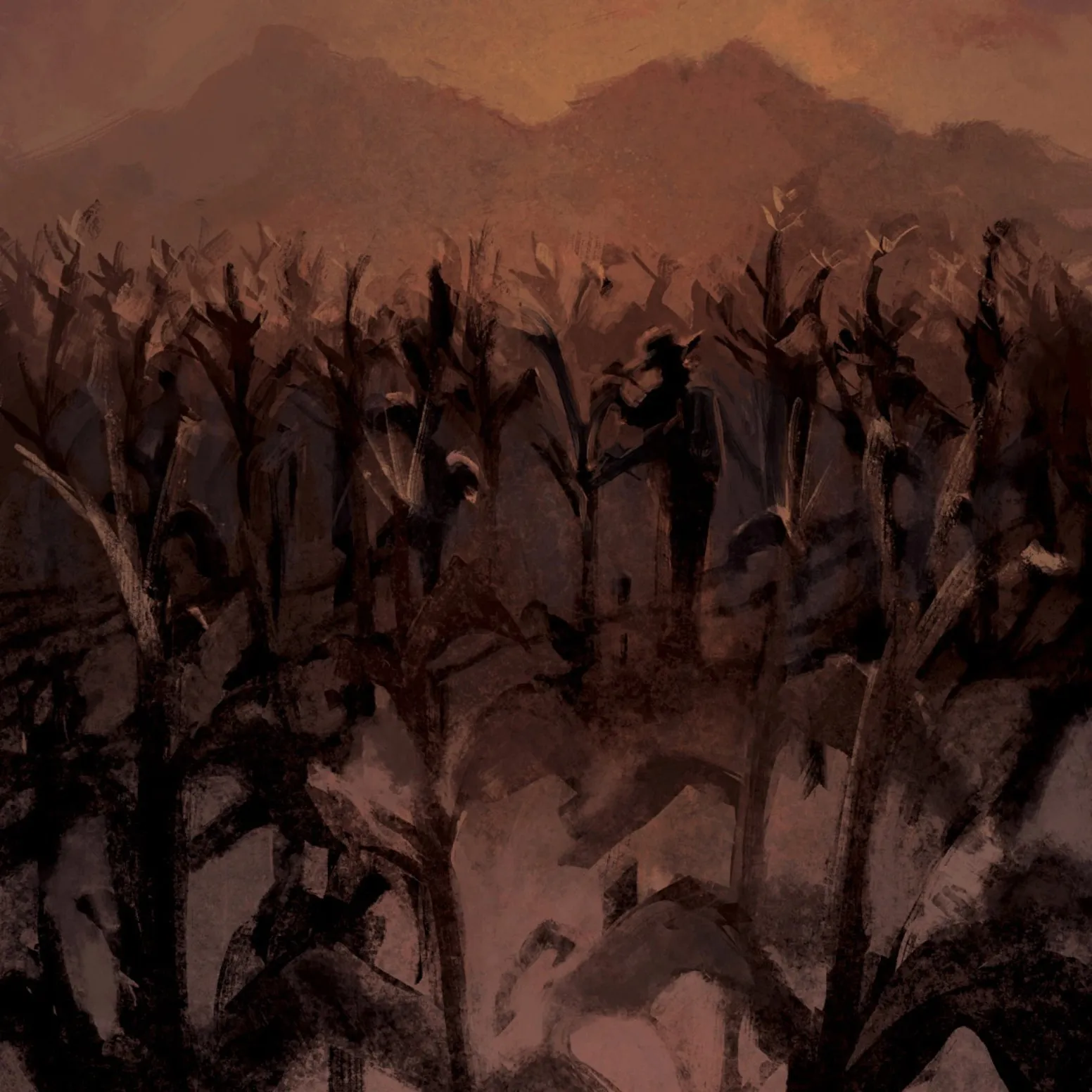
SUMMER
The sight of the fields in full bloom had become familiar to him. Young rows of flax marked the edge of his plantings like a gilded picture frame, capturing a verdant pasture of crisp leaves that promised plump squash in due time. Crimsoned leaves of perilla were bushy and abundant. The sun placed a halo atop everything it met.
Since Spring, he'd been heeding the scarecrow's advice. When to sow, how often to water, the right sort of fertilizer to use. It had all been so right, and the man couldn't remember the last time the land looked so full. He almost shouted the first time he saw all those tiny green buds sprouting up from the soil that he’d been so sure was long past its usefulness. As they kept growing, though, so did the weight of his solitude, only made worse by how little the new growth had eased it.
The man gathered his tools and headed for the fields. The storm had cleared, but its misty greys still hung in the sky, draping the fields in a dull opalescence.
"Still lonely," the scarecrow said first as the man walked up. "Feel it in your footsteps. The vibrations." The man paused and nodded. Whether the man spoke of his feelings or not, the scarecrow always seemed to know them. Still, it was nice having someone to talk to.
"Can't even remember what for," the man said. Both gazed out onto the fields. The greens and purples that had been so vibrant before the storm were now blended into a muddy brown. “You remember,” it said. “Just don’t want to.”
The man nodded again. "Guess so." He wiped some sweat off his brow. "Hot," he said. "Was hoping that storm'd save me the day."
The scarecrow was silent for a few seconds. It did that sometimes when it was thinking, or whatever the word was for the way it took in information from the earth and talked to the roots of the plants to divine what they needed.
"Few weeds in the far northwest corner. Strangling some of the pumpkin vines. Dry patch toward the center, look for where the soil's cracked. Not much else to do."
"Light work," the man said, grateful.
"You venturing out?" the scarecrow asked. The man was surprised; it rarely asked him questions, mostly dispensing advice.
"Town?" the man said. "Too far. Not much need either way."
"The woods," the scarecrow said. It swung a stick arm toward the trees at the edge of the field.
The forest was part of his land but the man couldn't remember the last time he'd been through it. He'd trekked a few times and found a waterfall a little ways in, though he quickly turned back from fear of disturbing the place. It seemed like a pointless diversion to revisit now, especially with the haze of the storm hanging in the sky, threatening to reconvene.
"Not much need," the man said again.
He got to work, ripping the weeds out by the roots. He tore off a leaf of shiso and took a bite; the bright, bitter taste felt cleansing. He noticed that the wind had blown the few blossoms off the apple tree; one of them lay limp and pathetic by the trunk. The sight made a hollow feeling in his chest.
Finished with the meager work, he made his way back to the scarecrow. "Anything else?" he asked.
"The woods," it repeated.
The man frowned. "Nothing new there. Shouldn't leave anyways. Storm might come back." The hot air felt thick, incipient, like a prelude to something worse than itself.
The breeze fluttered softly underneath the scarecrow's shirt and took with it errant bits of straw.
"Go to the waterfall. Take a swim."
The man stared into the darkness behind the trees. "Not much for swimming, either."
"Go and take it, like I'm telling you how much water to use."
The man hesitated, still gazing into the blackness.
"You'll remember the way," the scarecrow said.
The man steeled himself and headed to the woods.
The cover of trees wasn't as thick as he'd remembered, but it was dark enough that the shaking of leaves or the cracking of a branch could make him jump. He felt he'd been walking for a while and wondered if he'd gotten himself lost, if the scarecrow had been wrong. He trusted it implicitly about matters related to the farm but was starting to doubt how accurate it might be about other things. As he was about to turn back, he noticed light cracking through the trees ahead.
He parted the trees and entered the clearing. He hadn't seen it in years but the scene was intimately familiar to him. Lush, green trees made a wreath around the pool, brilliantly blue even on this overcast day and pearlescent where the falling water foamed against the rock. The sweet smell of damp wood and wet leaves were like a tonic, the hum of crickets and cicadas a soothing étude. He breathed in the rich air and held it in his lungs for as long as he could.
Once he disrobed he eased his old body into the water. Floating on his back, the sight of the misty sky brought to mind a feeling of innocence that he had known as a child. He surrendered - and for a moment he was drifting and weightless. His feelings of sadness and regret were buoyant and astray in the water beside him.
After some time, his eye was caught by something moving on the bank. He righted himself and waded over to find a turtle stuck on its back in the mud with stumpy legs waving indignantly. He tenderly slid his hand underneath the animal's shell and placed it on its feet. It waddled slowly into the stream and sank without sparing a look, leaving behind tiny bubbles on the water's surface. They quietly popped and then there was nothing there but the water itself.
On the way back to the farm, he spotted some mushrooms growing on the base of a tree. They were shaped like piles of seashells, bright orange caps that seemed to melt into the palest cream at the roots. He thought about picking them but kept walking.
He returned to the scarecrow, which was still gazing stoically at the crops. "Feel better?" it asked.
"Maybe better," he said. "No worse."
It was twilight. Usually, the man would have taken it as his cue to head back to his cottage but he felt like watching the sunset. He stayed there, trying to match the scarecrow's unbothered look.
A firefly sparked at the edge of the field signifying the fall of night. Another, a few feet away, returned the glow with a different cadence. "Always liked fireflies," the man said. "Used to catch them in a jar. Then I figured they didn't much like it - stopped." He smiled.
"Some say they're the souls of those gone," the scarecrow said.
More and more bugs flashed, at first one at a time and then in great groups until their flickers lit up the field in the dark of the night. The man stood transfixed by the dance. Each bug glowed a slightly different hue and flared at a different tempo, soundless notes from a luminous orchestra.
"I'd like to believe that," the man said.
The scarecrow took a moment to respond. The man thought that it might also be hypnotized by the waltz of lights, the same one it had seen every summer night since it was erected.
"It's good to be reminded sometimes," the scarecrow said, "of the company we have had."
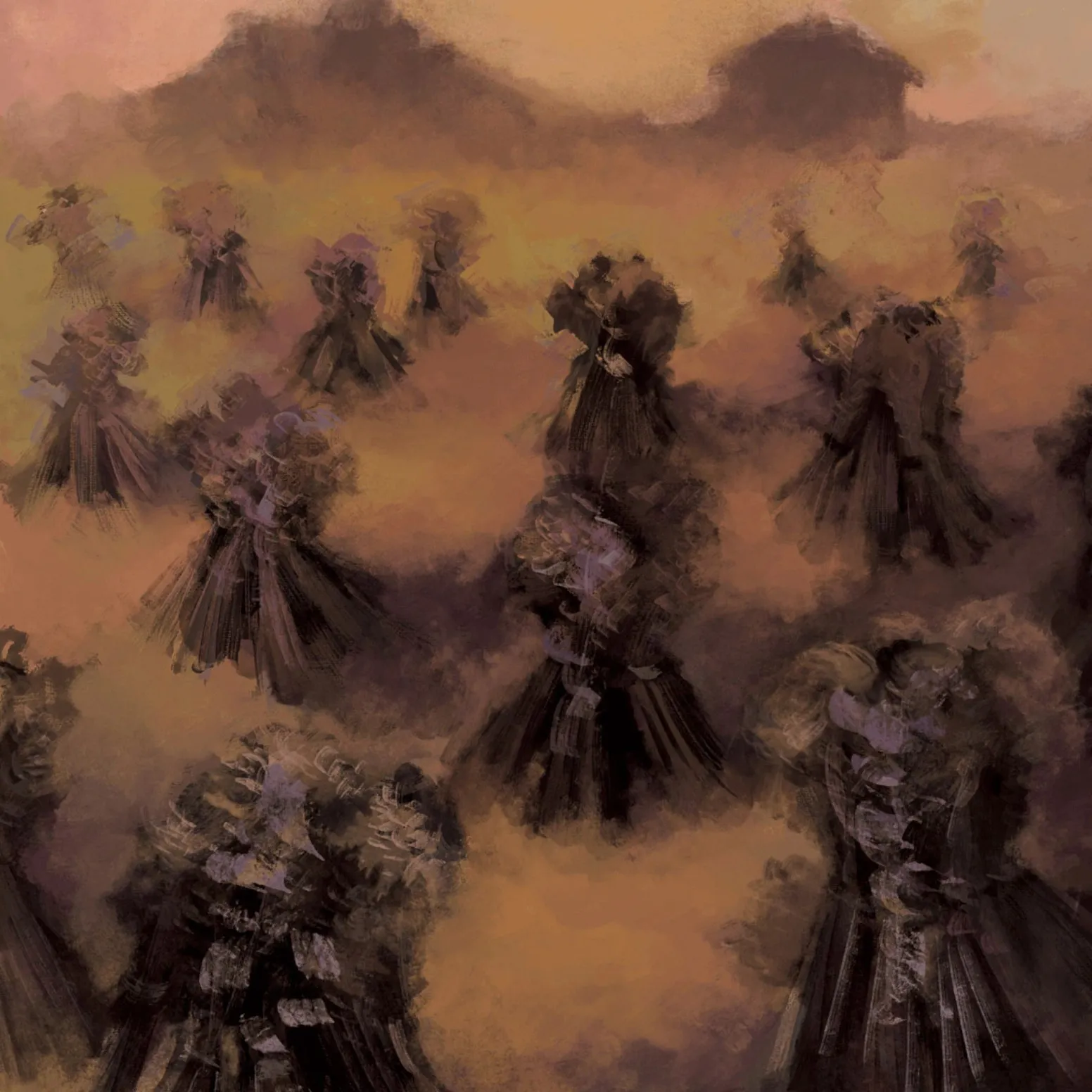
FALL
On this day it was not any of those sights that awoke his joy. The source of happiness lay just beyond, hanging from the apple tree. A single nascent fruit, no bigger than a large marble, but with a shine that seemed to illuminate the entire landscape. His heart danced in his chest.
"You see that?" he said to the scarecrow. "You see that!" again, louder, though he knew it had heard him.
"Patience rewards," it replied. The man shook it by the shoulder with glee. "But understand that this is not an end to the work," it said.
"Anything you say," the man said, giddy.
He got to work watering, trimming, and weeding, looking every couple minutes back at the apple which returned his gaze with a verdant glow.
He worked for hours without feeling tired. Every time he looked back at the fruit he gathered more energy. One apple was sufficient. It was all he wanted.
Finished, the man went beaming back to the scarecrow. "Never quite thanked you," he said.
"No need," the scarecrow replied.
The man was staring again lovingly at the tiny fruit, satisfied, when he saw its shine suddenly dull. It was only early afternoon, but the sky was beginning to darken. The man looked up, curious. Heavy clouds were materializing in the sky, spreading like ink blotches across the blue expanse.
Then came a smell. Dark, mineral and wet like something that had crawled out of a cave. The smell of rain. Then came the distant flash of lightning with a crack of thunder not far behind. The next strike was closer; he could see the jagged line it made in the sky.
The clear, crisp autumn weather had not foretold the coming of the storm. It had appeared in a moment - no omen had warned of its approach. The man looked at his crops which seemed to bend in anticipation of what was about to come.
He turned to the scarecrow but couldn't pull his eyes away from the sky.
"This one doesn't look right," he said, a shaking in his voice. "What should I do?"
The scarecrow began to speak, but the man only heard a rustle of straw before the storm found its mark. A furious gash of lightning blinded him and the scorched air assaulted his ears as it roared back into place, the whole earth seeming to shake underneath his feet. His eyes burned red and orange as his vision struggled to return.
The man rubbed his eyes as his sight slowly came back. Something was different, but he couldn't at first tell exactly what it was.
The apple tree lay in two smoking halves, split precisely down the middle. Only the stump remained, a thin trail of silver fumes rising from it.
The man did not think as he ran over to the tree. He burned his hand sifting through the ashes and throwing aside pieces of smoldering wood. He rolled over both halves of the trunk, grasping in desperation at every branch that was still intact.
The apple - that single apple - was gone. Not even the branch it hung upon remained. It too was charred and blackened.
He ran back to the scarecrow, close to sobbing, lungs heaving in pain from the smoke. The panic roiling in his brain refuted any attempt to express what he was feeling into words. He stared helplessly at the scarecrow for seconds before finally managing to speak.
"It's gone," he said.
The scarecrow stared back while the rain remained heavy and soaked through its clothes, making the straw wilt. It said nothing and remained still.
"No bringing it back?” the man asked, pleading. The scarecrow's gaze was aimless and distant.
"Talk," the man said. He heard the desperation in his own voice.
"Come on," he said, shaking the thing and staring into its sackcloth face. "Just need some help. Do your magic. Bring it back."
The scarecrow had been silent before when it took its time to think, but never for so long. There was something different too, about this silence - an emptiness with no serene gaze behind it, no careful contemplation of the fields or the sky. It was an inanimate silence with no promise of its own end.
He held the sackcloth face in his hands, tapping the sides gently as if to wake the scarecrow. "Need some help," he said. "Please." A dead silence, only the sound of rain.
He shook harder, eyes closed, his grip digging into the wet straw. “Just tell me what to do,” he said, and then he was screaming it and his hands were full of great clumps of straw, shreds of fabric, sticks snapping under his fingers. “Tell me what to do,” he shouted again, and he opened his eyes onto a heap of dead grass and limp wood and tattered clothes subsumed in the murk of thunderclouds still swallowing the sky.
The fields were soaked and muddy; gourds had been tossed from their places and lay scattered and half-formed. Vines were torn, leaves shredded and spread about like confetti, vegetables cleft and showing their innards. Everything was streaked with mud. The smoking stump of the apple tree watched over the scene.
The man knelt by the pile of broken things. It was hardly distinguishable from the brown earth.
A scrap of fabric floated away in a rivulet, spinning and knocking into banks of mud as it wended its way downstream.
The man didn't know what he was waiting for. Part of him, perhaps, still hoped that the thing might speak again.
The ruined pile lay silent.
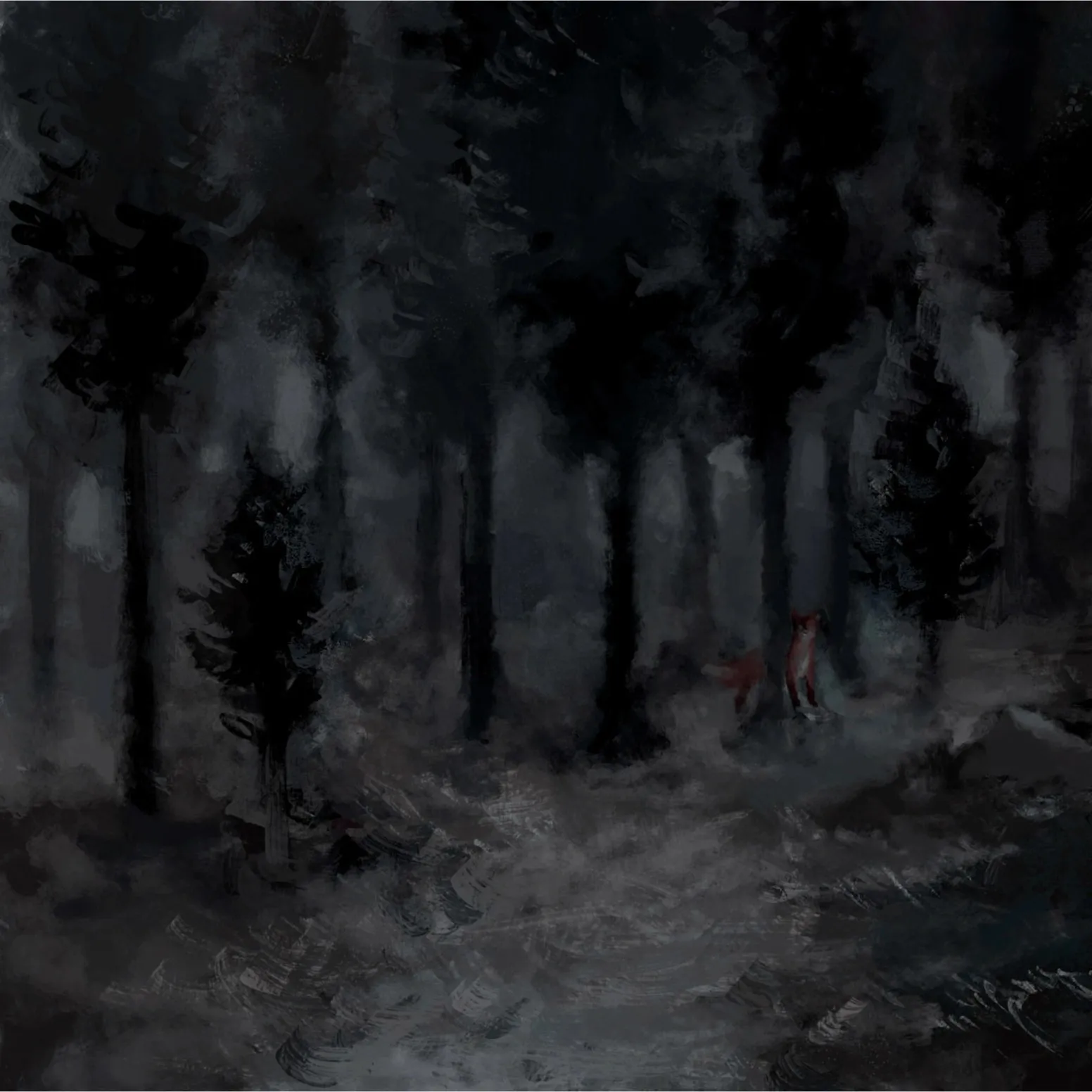
WINTER
WEEKS LATER THE MAN still could not wake without recalling what had happened the day of the storm as if it were the previous night's dream. A haze of images: the flare of lightning against the sky, a wilted burlap face, a smoking tree stump dusted with embers. The mound of straw, of mud-soaked fabric. He sat up in bed and stared into the old patched blanket keeping him warm, gripping the edge of it with his hands.
It was the first true freeze of the season and the ground was crisp with frost but the man had long given up going to the fields. He'd seen what remained of his crops the day after the storm, half-smashed and beginning to deflate with rot. He left them alone, figuring they might do something for the soil. Sometimes in the early mornings he'd catch a lone fat groundhog waddling around in the distance feeding on wilt and decay, disregarding its expected hibernation. He'd tried not to look at the remains of the scarecrow.
In the weeks since he'd started to wonder how much of the past year had been real. Maybe it had all been a vivid daydream, a fantasy of next year's abundance he'd conjured up to distract himself from a particularly dreary day. He had no calendar and no one to call upon, and nothing to confirm that the last few seasons had been anything but the ramblings of his lonely and raucous imagination. Nothing - except for those fields and the wreckage that still lay upon them.
Bundled in an old coat, the man made his way down.
Light snow coated the remains of what would have been his harvest, its gourds and greens melted to a swamp-like slurry from which emerged the occasional round fragment of still-solid plant matter. The stump of the apple tree was blackened at the top but no longer smoking; the rest of the trunk lay in pieces by its side, its tips carbonized like a petrified monument.
The scarecrow had all blown away save for a broken stick still protruding from the ground and a scrap of its shirt half-pinned underneath it. The man took the scrap and, without thinking, held it to his ear. He wasn't sure why; perhaps he was hoping that some ghost lived within it. He hoped for a reason to speak again himself. The coarse fabric scratched at his ear but made no sound.
The man put it in his pocket and walked away from the fields for what he thought would be the last time. Maybe until spring, maybe for good.
He had only been out for a few minutes, but he was winded when he returned to the house. Before going inside, he tossed some scraps into the cat's bowl and stared at the clouds drifting across the sky, grey and steel-like. He rubbed the scrap of fabric between his fingers and wondered where the scarecrow's spirit was now. Perhaps it was drifting in the ether or inhabiting some other scarecrow on some other farm.
At nightfall he heard a scraping sound at the front of his cottage. The man pulled himself out of bed and opened the door. Whatever had made the sound was no longer there; he saw something shadowed in the distance, a spectre disappearing into the woods. He looked down and saw a tiny apple at his feet. The fruit was imperfect, far from the jewel that had hung so briefly from his tree. It was bruised and pale, with a few red streaks marring its surface. It was misshapen too, with tiny bite marks puncturing its skin. Still, it was an apple and it was his.
He picked it up gently as though too firm a grip might cause it to vanish, to change from physical matter to the stuff of imagination. He stared at its imperfections for several seconds before finally taking a bite. The skin was crisp, the flesh sweet and bracingly tart and the perfume of its juices filled the air. As he savored it, he saw the fox's head emerge from the woods. It studied him from a distance with a calm and centered gaze and slowly backed into the forest. As it stepped deeper into the shadows its fiery coat cast copper - then green, then black, and it phased into the insatiable darkness beyond.
The man took his time with the apple, savoring the taste and paying attention to its journey on his tongue. Sweet to sour to sweet again. He kept watch over the trees, waiting for the fox to come out but it did not. Everything was still. He ate the apple down to its core, which he placed in the cat's bowl.
He tried to sleep but could not, exhausted as he was. Finally he rose and looked out the window, the piece of the scarecrow's shirt still in his hands.
The cat had finished the rest of the scraps, but the apple core was untouched in the bowl. He lifted it and carefully pried the seeds from the flesh one by one, placing them in the square of tattered cloth. Five little teardrops glowing with moonlight. He tied the scrap up with a piece of twine.
He returned to bed, placed the bundle on the table beside him and quickly drifted off. As he faded into sleep, he thought he heard a faint, scratchy voice saying something, but he could not tell what.